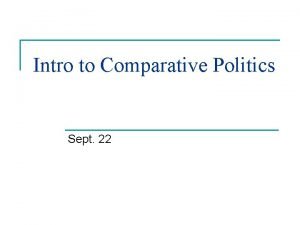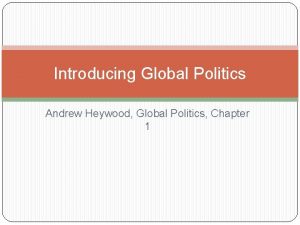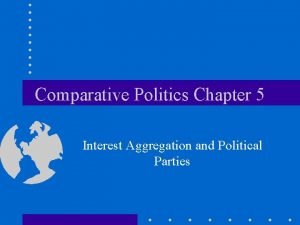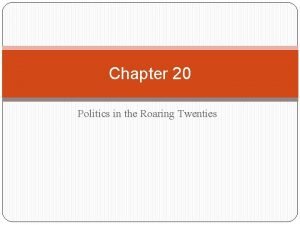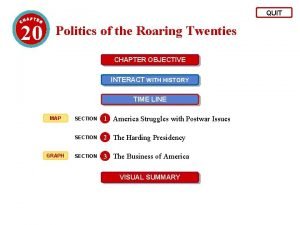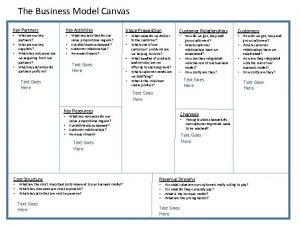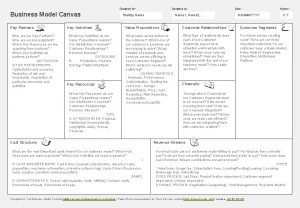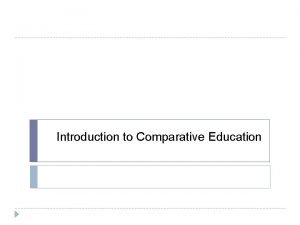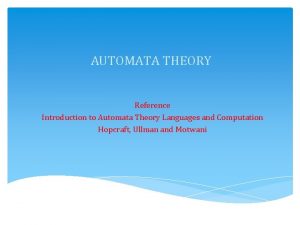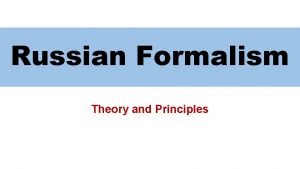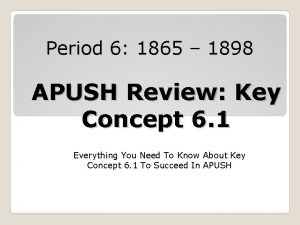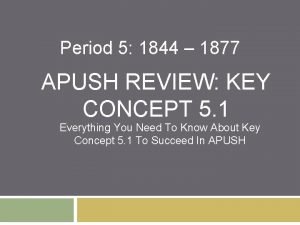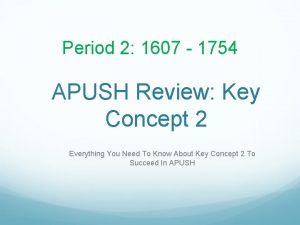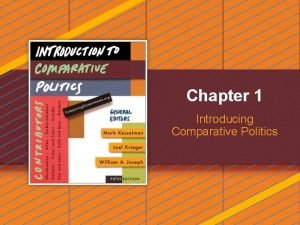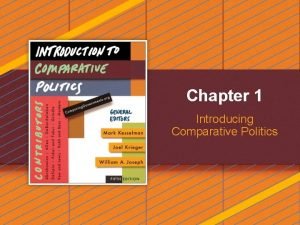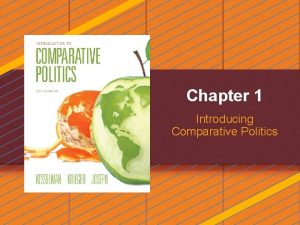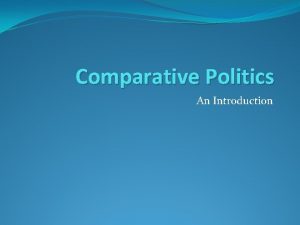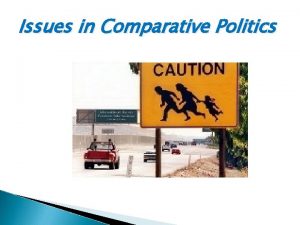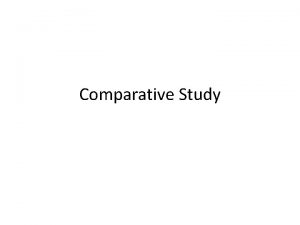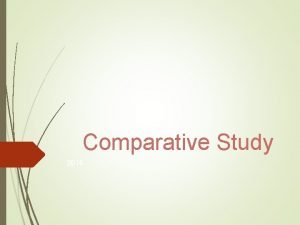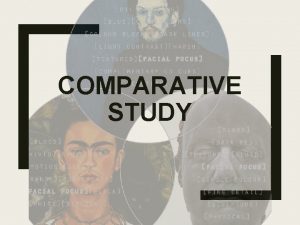The Comparative Study of Politics Key Concepts in
















- Slides: 16

The Comparative Study of Politics

Key Concepts in the Comparative Study of Politics: Who Gets What, When, and How ► Power: How People Get What They Want § Power as Influence ► Getting people to do what you want them to do ► Overcoming resistance § Power as Capabilities ► What abilities allow someone to have influence? ► Government office, money, control of military, etc. § Coercive versus Noncoercive Power With coercive power, a person is objected because of the rewards and/or punishments at his or her disposal. Noncoercive power rests on a different foundation. In this case, power results from a sense of legitimacy. Legitimacy is the belief in the right of an individual, a political system, or the state to rule. The belief in a right to rule does not mean that all government decisions are supported. ►


Key Concepts in the Comparative Study of Politics ► Weber’s Three Types of Authority: § Legal authority is based on a system of rules that is applied administratively and judicially in accordance with known principles. The persons who administer those rules are appointed or elected by legal procedures. Superiors are also subject to rules that limit their powers, separate their private lives from official duties and require written documentation § Traditional authority is based on a system in which authority is legitimate because it "has always existed". People in power usually enjoy it because they have inherited it. Officials consist either of personal retainers (in a patrimonial regime) or of personal loyal allies, such as vassals or tributary lords (in a feudal regime). Their prerogatives are usually similar to those of the ruler above them, just reduced in scale, and they too are often selected based on inheritance. § Charismatic authority is based on the charisma of the leader, who shows that he possesses the right to lead by virtue of magical powers, prophecies, heroism, etc. His followers respect his right to lead because of his unique qualities (his charisma), not because of any tradition or legal rules. Officials consist of those who have shown personal devotion to the ruler, and of those who possess their own charisma.

Examples of Types of Authority Legal Authority: Leaders in the Western World including presidents and prime ministers that are elected into office. ► Traditional Authority: Normally, constitutional and absolute monarchs, also religious officials. Queen Elizabeth II of the UK King Salman of Saudi Arabia Ayatollah Khamenei of Iran Charismatic Authority: leaders that lead by virtue, power, and heroism. Vladimir Putin of Russia Kim Jong Un of North Korea Fidel Castro of Cuba ►


Political Science as a Science ► Scientific Research and § Causality § Theories as “causal stories” Scientific Knowledge ► The Scientific Method: Six Steps § Develop a research question § Generate falsifiable hypotheses § Conceptualize and operationalize variables § Collect data § Analyze data about the variables § Think about a new research question

Figure 1. 1 An Example of a Hypothesis

Political Science as a Science ► How Scientific is Political Science? § It is limited in producing universal claims because it studies people § It attempts to measure and define politics, which is broad, complex, and multifaceted § It has difficulty controlling for various factors while examining the effects of another ► Goal is to Be “As Scientific As Possible”

Figure 1. 2 A Diagram of the Research Process

Methods of Comparing to Understand Politics ► Three Vital Questions When Designing a Research Project § What levels of analysis should be employed? § What form or forms of data should be collected and studied? § How many cases should be examined? ►Case Studies ►Quantitative (Statistical) Analysis ►The Comparative Method

Figure 1. 3 Possible Levels of Analysis in Comparative Politics

The Comparative Method - This method involves a small number of cases, but the careful selection of these cases helps to control for certain variables while evaluating the effects of others § Most similar approach -. The ‘most similar’ approach involves the selection of cases that are very much alike in most regards, aside from a key independent variable that might explain the dependent variable under study § Most different approach -. The ‘most different’ approach entails selecting cases that differ in some ways – aside one independent variable, such that the relationship of that factor to the dependent variable can be examined with some confidence. § Cross-regional approach - Cross-regional’ approaches examine sets of countries from different world regions, combining elements of the most similar and most different methods.

A Framework for Comparative Politics: “Structure vs. Choice” Understanding Political Outcomes by Examining “Structures” § Structures (domestic and/or global) determine how political decisions are made § Looks beyond decisions and decision makers Four Categories of Structure § Economic § Cultural § Identity § Political (political institutions)

A Framework for Comparative Politics: “Structure vs. Choice” ► Understanding Political Outcomes by Examining “Choices” ► Two Sides of the Choice Approach § Individuals and leadership matter § How individuals make decisions matters

A Framework for Comparative Politics: “Structure vs. Choice” ► Structure, Analysis Choice, and Levels of § For the “choice” approach, level of analysis is typically the individual § For the “structure” approach, level of analysis is the state, political system, society (or a combination of these), or even the international community
 Political comparative and superlative
Political comparative and superlative Comparative theories politics a level
Comparative theories politics a level Global politics andrew heywood
Global politics andrew heywood Interest aggregation in comparative politics
Interest aggregation in comparative politics Ap government unit 1 study guide
Ap government unit 1 study guide Chapter 20 section 2 the harding presidency
Chapter 20 section 2 the harding presidency Politics of the roaring twenties
Politics of the roaring twenties Cost structure example business model canvas
Cost structure example business model canvas Key partners
Key partners Comparative comparative
Comparative comparative Study and central concepts of automata theory
Study and central concepts of automata theory Russian formalism theory
Russian formalism theory Key concepts examples
Key concepts examples Apush period 6 key concepts
Apush period 6 key concepts Apush period 5 key concepts
Apush period 5 key concepts Apush unit 3 review
Apush unit 3 review Apush key concepts period 2
Apush key concepts period 2
